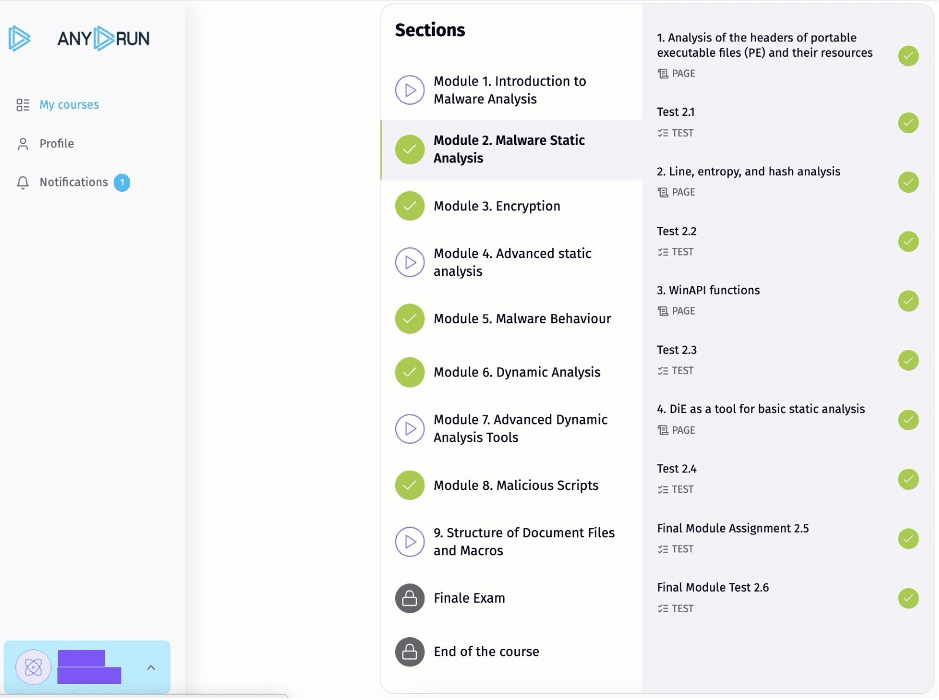In an era of rapid technological change, universities face increasing pressure to provide students with up-to-date, industry-relevant training — while managing tight budgets, staffing shortages, and evolving student expectations. Outsourcing professional educational programs to specialized providers offers a strategic solution to these challenges.
One standout example of this approach is ANY.RUN’s Security Training Lab that allows students to explore and analyze malware in a safe, real-world environment. Let’s explore how outsourcing professional educational programs like this can benefit universities and their stakeholders.
Access to Expertise and Industry-Relevant Content
One of the primary advantages of outsourcing is access to specialized expertise that universities may lack in-house. ANY.RUN’s Security Training Lab exemplifies this benefit by offering interactive training in malware analysis and threat hunting, designed by cybersecurity professionals. The program includes:
- 30 hours of academic content including texts, illustrations, video lectures, interactive tasks, and tests.
- Access to ANY.RUN’s solutions with special plans for teachers and team licenses for students.
- Actual threat samples as learning materials; examples of techniques and tactics being employed by hackers right now.
- Fast and easy-to-use platform handy for monitoring student progress and performance.
- Private Discord community with tips, lifehacks, and news. Encourages collaboration, teamwork, and knowledge sharing.

STL’s contents and structure
The course provides real-world scenarios, such as analyzing malicious files in a safe, cloud-based sandbox, ensuring students gain practical skills that align with current industry demands.
For university managers and professors, partnering with ANY.RUN eliminates the need to recruit and retain niche experts, which can be challenging given the global IT talent shortage. Instead, Security Training Lab delivers pre-built, expert-designed content that integrates seamlessly into curricula, allowing faculty to focus on teaching rather than course development.
Happy Birthday ANY.RUN, Happy Offer Everyone
After nine years of dissecting malware day in and day out, ANY.RUN’s team knows a thing or two about turning their expertise into practical coursework. To celebrate the anniversary , they’re handing out bonus licenses for Security Training Lab.
| Buy 5, 10, 15, or 20 licenses—and get 1, 2, 3, or 5 extras, respectively. |
Cost Efficiency and Resource Optimization
Outsourcing professional programs reduces substantial upfront investments in infrastructure, faculty training, or technology development. ANY.RUN’s cloud-based platform, for instance, requires no on-campus hardware or software installations, saving universities the cost of building and maintaining their own cybersecurity labs.
Universities can allocate funds and staff time to core academic priorities, such as student engagement and research, while ensuring high-quality training through providers like ANY.RUN.
Scalability and Flexibility to Meet Demand
Educational institutions often face fluctuating student enrollments and evolving program requirements. Outsourcing provides the flexibility to scale programs up or down without the logistical challenges of hiring, training, or laying off staff. ANY.RUN’s Security Training Lab is designed to accommodate varying class sizes and skill levels, offering scalable training modules that can be tailored to undergraduate, graduate, or continuing education programs.
Enhanced Student Outcomes and Employability
Students today expect programs that prepare them for immediate employment in competitive fields. The Security Training Lab immerses students in real-world cybersecurity challenges, such as analyzing malware or responding to cyber threats, equipping them with practical experience that employers value. Certifications and skills gained through the platform can be added to resumes, giving graduates a competitive edge in the job market.
For professors, integrating ANY.RUN’s lab into their courses enhances teaching effectiveness by providing interactive, hands-on tools that engage students and reinforce theoretical concepts. Decision-makers can also highlight these industry-aligned programs in marketing efforts to attract prospective students, further strengthening the institution’s reputation.
Conclusion: A Smart Investment in Future-Ready Education
Outsourcing professional educational programs is no longer just a cost-saving measure — it’s a strategic decision that allows universities to remain competitive, deliver value to students, and meet industry demands. For decision-makers seeking to enhance their institution’s cybersecurity curriculum, outsourcing is not a compromise—it’s an upgrade.

